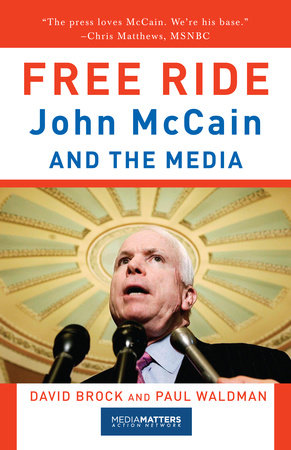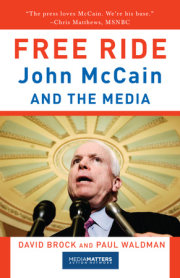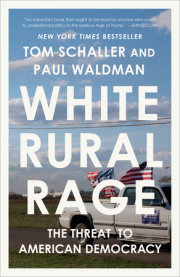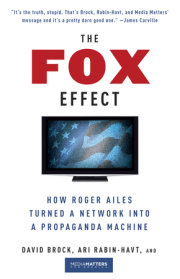Chapter 1
How He Won Their HeartsSteve: My friend and I have this argument, and here it is. He says when you're at a place like this, you can't just be yourself, you need an act. So anyway, I saw you standing there, so I thought, A, I could just leave you alone; B, I could come up with an act; or C, I could just be myself. I chose C. What do you think?Linda: I think that A, you have an act, and that B, not having an act is your act.--Singles (1992)There's no doubt about it: John McCain is a popular guy. In an age of partisan rancor, he gets favorable ratings not just from members of his own party, but from plenty of independents and Democrats as well. He is considered both ideologically moderate and someone to whom the excesses of contemporary politics--artificiality, nastiness, preferential treatment for financial backers--don't seem to apply.But nowhere is McCain more popular than with the Washington, DC, journalistic establishment. Indeed, one struggles to recall a prominent political figure in recent decades who has received such sustained adulation from the ordinarily cynical press corps.How did he do it? How did John McCain manage to turn a pack of snarling beasts into obedient service animals, ready to do his bidding at every turn? As a starting point, it is important to keep in mind that it is, in fact, something McCain did, not something that happened by accident. While every politician seeks the best news coverage he or she can get, McCain employed a strategy that has been uniquely effective. And it is a strategy.
The Three FoundationsThe press's affection for John McCain is built on three foundations: his Vietnam experience, his advocacy for campaign finance reform, and his style in dealing with reporters. McCain and his advisers display a deep understanding of how each functions, how to sustain their effectiveness, and how far they can be pushed. At first glance, these may seem like three very different matters: a factor of personal biography, a prosaic and often arcane policy issue, and a simple matter of personal relationships. But when it comes to McCain they actually have a great deal in common and add up to a portrait the press paints of the Arizona senator as not simply unlike other politicians, but the very antithesis of other politicians. Like a concave mirror, the prism through which the press views their subjects takes all that they dislike about politicians and inverts it to construct the figure of John McCain.In all three cases, McCain has become for the press the opposite of everything they think is wrong with things as they are, and so he comes to embody for them the hope of a better politics. They view politicians as craven; McCain's undeniable courage in Vietnam casts him as the bravest of politicians, whether such bravery is truly in evidence at a particular moment or not. They view politicians as shameless supplicants to their contributors; McCain's advocacy of campaign finance reform makes him in their eyes the premier "reformer" in American politics (despite the weaknesses of the legislation he advocates and his spotty record on reform). They view politicians as cynically manipulative, fundamentally artificial, and endlessly hostile when it comes to dealing with journalists; McCain's attentive courting makes him "genuine" and "authentic" in a way no other politician can seem to achieve.It is this last factor--the manner in which McCain has flattered, befriended, and courted reporters--that makes the other two factors meaningful. After all, there are other politicians who have heroic deeds in their past and have made efforts on behalf of reform. Like McCain, Ross Perot's 1992 running mate, James Stockdale, endured years in the Hanoi Hilton, but his Vietnam suffering didn't turn him into a press hero during his brief moment on the national stage; Republican congressman Sam Johnson of Texas was a prisoner of war in Vietnam for nearly seven years, but has never attracted any particular attention from the news media. Like McCain, Democrat Russell Feingold has spent much of his time in the Senate advocating political reform--indeed, Feingold's record on this front is superior to McCain's--but he is nowhere near the press favorite McCain is. In short, it is the combination of all three factors that produces McCain's unique status with the Washington press corps.The result is that when McCain runs for office, he is described as the "anti-candidate"1 (Christian Science Monitor) or "anti-politician" who runs an "anti-campaign"2 (New York Times) and "refuse[s] to be scripted"3 (St. Petersburg Times). The press uses McCain to define what it does not like about politicians and campaigns, a living rebuke to the shortcomings of modern politics.
Foundation 1: VietnamJohn McCain endured terrible suffering during the five and a half years he spent as a prisoner of war in Vietnam, and in the course of that time he displayed admirable courage, even heroism. No one would contest those facts. But it does not necessarily follow that McCain's Vietnam history should function as a halo reducing all questions of character--a press obsession, particularly when it comes to presidential candidates--to the story of the Hanoi Hilton. To be sure, McCain's Vietnam experience is a key part of his character, but it is, after all, only a part.But that is not how the press sees it. It does not minimize McCain's courage and suffering in Vietnam to note that for no other politician does something that happened nearly forty years prior play such a prominent role in their own candidacy and in how the press discusses that candidacy. Other candidates--John F. Kennedy, George H. W. Bush, Bob Dole, and John Kerry, to name a few--have used their war records as selling points. Indeed, American politicians ever since George Washington have found political benefit in their military history. But war service was a part of the story those politicians told about themselves and the story the press told the public about them. For McCain, on the other hand, Vietnam is nearly the entirety of the character story we are told.Other politicians find features of their biographies mentioned when they are relevant to the story at hand. The fact that John Kerry is a Vietnam veteran might be brought up by a journalist doing a story about, say, a proposal Kerry made on veterans' benefits. Dick Cheney's tenure as CEO of Halliburton will be discussed in a story about the White House and military contracting. But McCain's POW experience is different. Journalists do not hesitate to mention it even when it has absolutely nothing to do with the story; instead, it is often tossed into stories by reporters almost in an offhand way, as though it were necessary to constantly remind readers of his trials. To take a typical example, a May 2006 Christian Science Monitor piece previewing the 2008 presidential race contained this sentence: "But conversation inevitably turns to Arizona's Sen. John McCain, whose directness sometimes disturbs his conservative colleagues, but whose valor while a prisoner of war in Vietnam enamors many voters."4 There have been literally hundreds of articles that include a line on the order of "McCain, who spent five and a half years as a prisoner of war . . . ," as though that were his middle name. And not just when it comes to topics like the treatment of prisoners in Iraq or Vietnam itself. Often it is offered as a simple description of who McCain is. When McCain endorsed Charlie Crist for the Florida governorship, the St. Petersburg Times wrote, "McCain called Crist a reformer who's right on the issues. McCain is a decorated Vietnam War veteran and former prisoner of war and a likely 2008 Republican presidential candidate."5 When he comes to town, local papers will make sure to remind readers who he is: "McCain, a Navy officer and former prisoner of war in Vietnam, is in his fourth term as senator from Arizona and ran for the Republican nomination for president in 2000. He's planning to return to Alabama in October to headline the Jefferson and Shelby counties' 'Grand Ol' Dinner,'" read a recent article in the Birmingham News.6 At other times, his POW experience will be mentioned as a narrative technique to contextualize something else--like his reputation as a maverick. "John McCain, as a Navy pilot shot down over Hanoi, took a five-year beating from his Vietnamese jailers for refusing to break," wrote the Washington Times. "Sen. John McCain, 61, is being battered now by fellow Republicans, this time for ideological deviations usually associated with exponents of big government, and only with words."7One finds the line popping up as a non sequitur in articles about budget disputes ("Arizona Sen. McCain, who spent five years in a North Vietnamese prison, criticized fellow Republicans on Tuesday for pushing for more tax cuts while U.S. troops were fighting in Iraq and Afghanistan"--Associated Press),8 legislation on Internet gambling ("But with the war now apparently winding down, McCain said he will reintroduce a sports betting ban bill 'soon,' although he declined to give a date. 'I was waiting until the war kind of quieted down,' said McCain, who spent 5? years as a prisoner of war in Vietnam"--Las Vegas Review-Journal),9 the role of faith in politics ("The questioner noted President George Bush's frequent reference to his Christian faith. No great leader ever served without relying on faith, said McCain, a five-year prisoner of war in Vietnam"--Baton Rouge Advocate),10 or even his bout with skin cancer ("McCain, who spent 5? years as a prisoner of war in North Vietnam, was expected to make a statement later Friday after meeting with his physicians at the Mayo Clinic in nearby Scottsdale, Ariz."--Chicago Tribune).11 One Newsweek story from the 2000 campaign related how McCain responded when someone insulted his wife: "McCain remained impassive. He was trying to maintain what sailors call 'a steady strain,' a nautical term for keeping the right amount of tension on a rope. It was McCain's own defense mechanism, developed during five and a half years of captivity, a private caution against letting your hopes get too high or too low."12 Either the reporter just assumed that McCain's reaction had something to do with his POW experience, or McCain later told him that was what he was doing. Either way, it got a reminder of Vietnam into the story.McCain's POW history even turns up in pop culture: an October 2006 episode of the CBS reality show The Amazing Race sent contestants to the Hanoi Hilton, where they had to find McCain's flight suit to locate the clue that would guide them to their next destination (McCain himself has also appeared on the screen, including cameos in the film Wedding Crashers and the television series 24, and hosting Saturday Night Live). On the news, events with only the most tenuous connection to McCain can become an excuse for reminding the public that McCain was a prisoner of war. One May 2006 story on ABC's World News about the Navy sinking the aircraft carrier Oriskany to form a reef started as a nostalgic story about an old ship, but then turned into a virtual campaign ad for John McCain, complete with photos of him from Vietnam ("McCain remembers his final takeoff from the carrier in 1967, the day he was shot down, the start of five years of captivity").13In fact, seldom does a day go by when somewhere in the American media some reporter is not reminding us that, in case you weren't aware of it, John McCain was a POW in Vietnam. As the figure below shows, at times the cascade of stories with references to McCain's captivity has been positively torrential.14 The number of such mentions was highest in 1999 and 2000 during his first presidential campaign, subsided somewhat from 2001 to 2003, then picked up again in 2004.A key part of McCain's Vietnam story as the press tells it is that the senator is reluctant to mention it. "One of the things I've never tried to do is exploit my Vietnam service to my country because it would be totally inappropriate to do so," McCain once said.15 But for someone who says he doesn't want to talk about his experience as a POW, McCain sure does bring it up a lot. Consider a long 1999 article in Esquire, titled, with no apparent sarcasm, "John McCain Walks on Water." McCain told the reporter, "When somebody introduces me like, 'Here is our great war hero,' I don't like it. I want to be known as the guy who's trying to reform the telecommunications business, who's trying to see the cable rates deregulated. I mean, Jesus, it can make your skin crawl."16 Yet from the very beginning of his political career, McCain has known just when to pull out his POW history for maximum effect. The key moment of his first congressional race came in a debate when McCain responded to an accusation of carpetbagging by saying, "As a matter of fact, when I think about it now, the place I lived longest in my life was Hanoi." Questioned about whether he was supporting George W. Bush's reelection with enough enthusiasm, McCain said, "There's this continued buzz out there that I do some of the things I do because I'm angry about the 2000 campaign. My response to that is that I forgave the Vietnamese and have worked for thirty years to heal the wounds of the Vietnam War. If I can get over that, am I going to hold a grudge because of a political campaign? I don't think so."17 Asked why he was running for president, McCain joked, "Well, my wife, Cindy, believes it's because I received several sharp blows to the head while I was in prison."18McCain's insistence that he doesn't want to talk about Vietnam is further belied by the fact that he built his entire 2000 campaign for the presidency around the POW story. His first television advertisement in New Hampshire was a sixty-second spot featuring black-and-white still photographs and footage of McCain as a young fighter pilot. Another ad featured McCain strolling through Arlington National Cemetery (later, the ad had to be edited to comply with Army regulations that prohibit partisan activity on cemetery grounds).19 Faith of My Fathers, McCain's memoir of his wartime experience, came out in 1999, conveniently timed for the start of his campaign. Unlike the typical campaign book, it did not survey McCain's entire life, just his time in Vietnam. The dominant image of McCain displayed throughout his run was of him in a Navy flight suit, standing next to a jet, in 1965. Poster-sized copies were available for $15 on his campaign Web site.
Copyright © 2008 by David Brock. All rights reserved. No part of this excerpt may be reproduced or reprinted without permission in writing from the publisher.






